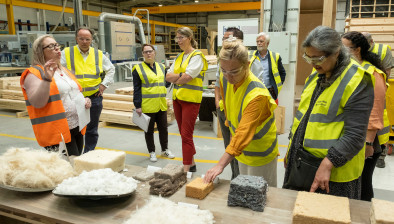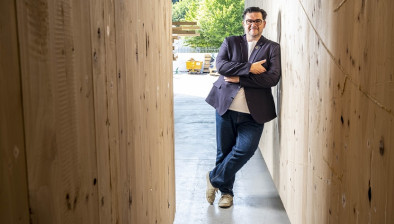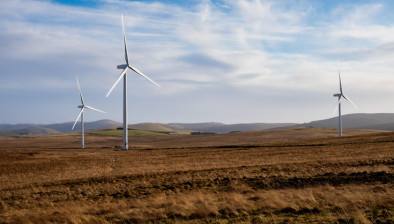Just Transition Commission to consider how Scotland can produce future construction workforce
Members of Scotland’s Just Transition examine innovative insulation materials at Built Environment – Smarter Transformation centre in Blantyre
Scotland’s Just Transition Commission is to meet with construction workers in Glasgow and the Lanarkshire area this week to hear directly about the changes ahead for the building industry as part of the national effort to tackle the climate emergency.
The independent expert advisory group advises the Scottish Government on how the country can achieve a carbon neutral economy fairly. The Commission will visit sites and education facilities in Glasgow, Blantyre, Coatbridge and Hamilton today and Wednesday to learn about how Scotland can develop the workforce required to retrofit Scotland’s existing buildings as part of the economy-wide transition to net zero.
The Commission will hear directly from those whose lives and livelihoods are most likely to be impacted, including a visit to a construction sites in Coatbridge to hear from young apprentices, South Lanarkshire College where they will hear about unlocking further opportunities for the College and wider college sector, and an open “town hall” session at The Studio in central Glasgow on Tuesday evening where they will hear further from workers about what it’s like working in the construction industry and how the industry needs to change as it goes green.
The Commission will publish a short report over the summer with advice to the Scottish Government based on findings from its visit to Glasgow and the surrounding area. Last week the Scottish Government published three discussion papers about how best to achieve a just transition for three sectors: the Built Environment and Construction, Transport and Land Use and Agriculture.
The Commission aims to make sure the benefits and burdens of the major changes involved in Scotland’s net zero transition are shared as fairly as possible. It is chaired by Prof. Jim Skea CBE, a climate scientist and a leading member of the Bureau of the Intergovernmental Panel on Climate Change, a United Nations body whose reports have played a key role in shaping global understanding of the climate emergency over the past 30 years.
The Just Transition Commission’s remit is to:
- Scrutinise the development of just transition plans led by the Scottish Government
- Advise on the best approach to monitoring and evaluation of the just transition
- Engage with people most likely to be impacted by the transition, hearing from a wide range of representative voices.
The Commission will publish a report each year scrutinising Scotland’s progress as well as short reports with findings on specific sectors and issues. Its members include representatives of environmental groups, trade unions, business, industry, and community organisations.
In April, the Commission published detailed advice on the Scottish Government’s plan to deliver a green energy system, including the need for detailed risk assessment and contingency planning, the huge opportunity for good jobs to be created in order to construct the new infrastructure that will be required, and the need to ensure these jobs meet fair work standards.
The Commission has so far visited the Western Isles, Peterhead, Aberdeen, Blantyre, Dundee and Edinburgh. Last month it visited Grantown-on-Spey to learn about of how major changes needed to reach Net Zero are being communicated to farmers, land managers, and the local community so they can plan for the future.
Commission chair Jim Skea said: “As part of Scotland’s just transition, we urgently need to decarbonise our buildings. That brings with it a tremendous opportunity in terms of jobs that will add real and lasting value to our economy. The Commission is in Glasgow this week to hear directly from construction workers and apprentices, the people whose skills and ingenuity will make this happen.”
Commissioner Stephen Good, CEO at Built Environment – Smarter Transformation, said: “Retrofitting our existing buildings, particularly Scotland’s hard-to-treat historic ones, will mean an entirely new workforce must come into play. This includes designers, coordinators, manufacturers, installers, contractors and educators. We need to be seen as an industry of choice, not, as is often the case, an industry of last resort.”




















